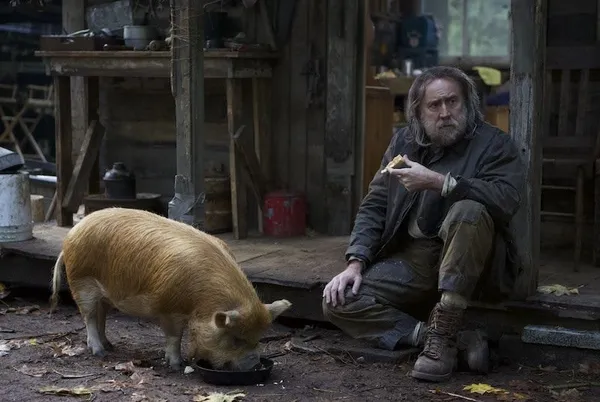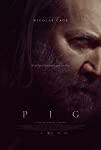Eye For Film >> Movies >> Pig (2021) Film Review
Pig
Reviewed by: Andrew Robertson

It is in the names of restaurants that Pig gives us the best clue as to its nature. We visit two, Eurydice and Hestia. The latter, Goddess of the hearth, a space that is now a bakery. The former, indicative of the griefs that drive the film. It is not an Orpheus that seeks to restore the dead wives of the film, but Rob. Red of breast from early injuries, grey of beard and lank of hair, wrapped in garments heavy with woe and weariness.
To call it a return to form for Cage is to dismiss the fact that his intensity is constant but its direction is not. Here the generosity of performances in a small cast is reflected. For sure there is some probable ADR from children, Brandy and Cura as the eponymous animal are charismatic enough but it's how Rob interacts that sells it.
After the gala screening I saw at Glasgow's Film Theatre as part of Edinburgh's International Film Festival, in the supermarket just down from Rose Street, I heard a couple discussing choreography. The dish in question from Portland's Le Pigeon, pigeon with mushroom. The small frames halved at the breast, the pan with garlic, thyme, that fungal depth. The layers of potato, scion of family rich akin to Dauphinoise, cut thin upon the other mandolin. Mirrored in its preparation, but that is the third course.
Not chapters. Not courses, either, for there is but one in this near odyssey. Parts. The first Rustic Mushroom Tart, the second Mom's French Toast and Deconstructed Scallops, the third A Bird, A Bottle, & A Salted Baguette. From those there is meaning but in the description of other dishes comes more. Overcooked pasta in a look. A liver scotch egg with, if memory serves, a mustard cream.
The city overwhelms. Double exposures, sound builds and the score matches. There is a moment of quiet percussion from a handpan, an instrument akin to a small steel drum. Yet as with the slicer it's homophonous to the mechanisms of recovery here. The tool here is not lyre but fire, food and cooking.
At one point Rob makes a claim that is more of Jack Vance than l'Escoffier, but the spell binds more firmly than any combination of egg or flours. There are lessons in classical music but that is a cold appreciation, a technical one, music as something alien. Certainly less visceral than a gutful of breakfast, a glass of abdominal punch. For sure it might be in keeping that a small diner on an Oregon country road has what sounds like Tom Waits on the jukebox, but in and among everything else that was the note that gave the sense of unreality.
Patrick Scola's camerawork is gorgeous, crisp, an absolute treat on the big screen. In a short filmed introduction director Michael Sarnoski and writer/producer Vanessa Block talked about the cinema as "the proper environment" and absolutely this is the case. From the bucolic to the melancholic, landscapes and geographies physical and psychological and apocalyptic. The return of the sea. The end of the land.
There's a credit for a food and beverage stills photographer, a balloon technician for aerial shots, a moment through a bakery window that recalls Hopper's Nighthawks. Made easier by the removal of curtains, but that itself is explained.
A debut feature for Sarnoski, who's worked with Block on a short before, this is stunning. It's an astonishing performance from Cage, but in the act there's support for Alex Wolff and Alan Arkin. Is it reading too much that Amir (Wolff) is princely? That Darius (Arkin) is brought into conflict (and repeatedly) with the Hellenic flavours? Perhaps not. It's the weight of myth, of fable.
There have been comparisons drawn to John Wick, if only because there is an animal here, revenge, a dead wife. More accurate, more in its favour is in the pulling back of a curtain to an underworld. The extent that names have power, labyrinths and mazes, all work towards a cycle of storytelling that is not absolutely wedded to the hero's journey.
It is not without flaw. There are perhaps more dead female characters than with speaking roles. There are moments of violence, distress, that may themselves distress. That's less a flaw than a warning though. At just over 90 minutes it is perhaps greed to ask for more, the journey here from farm to table does satisfy. It is a treat to look at, it has style in spoons if not spades. The Joel Palmer House restaurant also provides a dish for the screen, but mapping individual contributions in any work is difficult.
Cage fills the screen even when he does not. There is a moment when he reaches for a glass of wine, more than one in fact, where the who and he and how is as much a part of the terroir as any aspect of lighting or tone. The extent to which his presence complements and lifts other performances cannot be understated. Few things enhance flavour like salt, it is a function of our chemistry. Cage does the same, copper taste of blood, bottom pans, cast and iron. To borrow from another myth, this is our lot.
Reviewed on: 19 Aug 2021


















